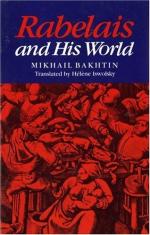
|
| Name: _________________________ | Period: ___________________ |
This quiz consists of 5 multiple choice and 5 short answer questions through Chapter 3, Intro. cont. & Chapter 1 - Rabelais in the History of Laughter.
Multiple Choice Questions
1. The purpose of "travesty" in folk festivals was to:
(a) Indicate the importance of travel to an individual's self-development.
(b) Call upon something serious and make it amusing.
(c) Reassert traditional definitions of social and spiritual life.
(d) Irreversibly denigrate everything it could.
2. When the grotesque was revived in the Romantic era, what did it react against?
(a) Individual, sentimental ideas.
(b) The rediscovered works of Shakespeare and Cervantes.
(c) Imaginative fantasy.
(d) Neoclassical, rational, Enlightenment thought.
3. In the seventeenth century, the decline of laughter as a primary force in folk culture resulted from:
(a) An increasingly "official" culture of rationalism.
(b) The need of the public for other forms of diversion.
(c) The declining number of Carnival performers.
(d) The exhaustion of any new sources of humor.
4. Carnival allowed:
(a) The endurance of the propriety expected of all social classes.
(b) The mixing of real and unreal, fantasy and fact.
(c) The peasants to sell their crops without paying taxes.
(d) The upper class to oppress relentlessly the lower class.
5. When did the Russian Revolution occur?
(a) 1945.
(b) 1917.
(c) 1936.
(d) 1850.
Short Answer Questions
1. Mikhail Bakhtin is:
2. After Rabelais' time, the use of laughter in literature and culture moved in which direction?
3. What is "man's second nature," according to Renaissance Christian doctrine?
4. In which twentieth-century movement was the grotesque especially evident?
5. Medieval parodies were:
|
This section contains 307 words (approx. 2 pages at 300 words per page) |

|




